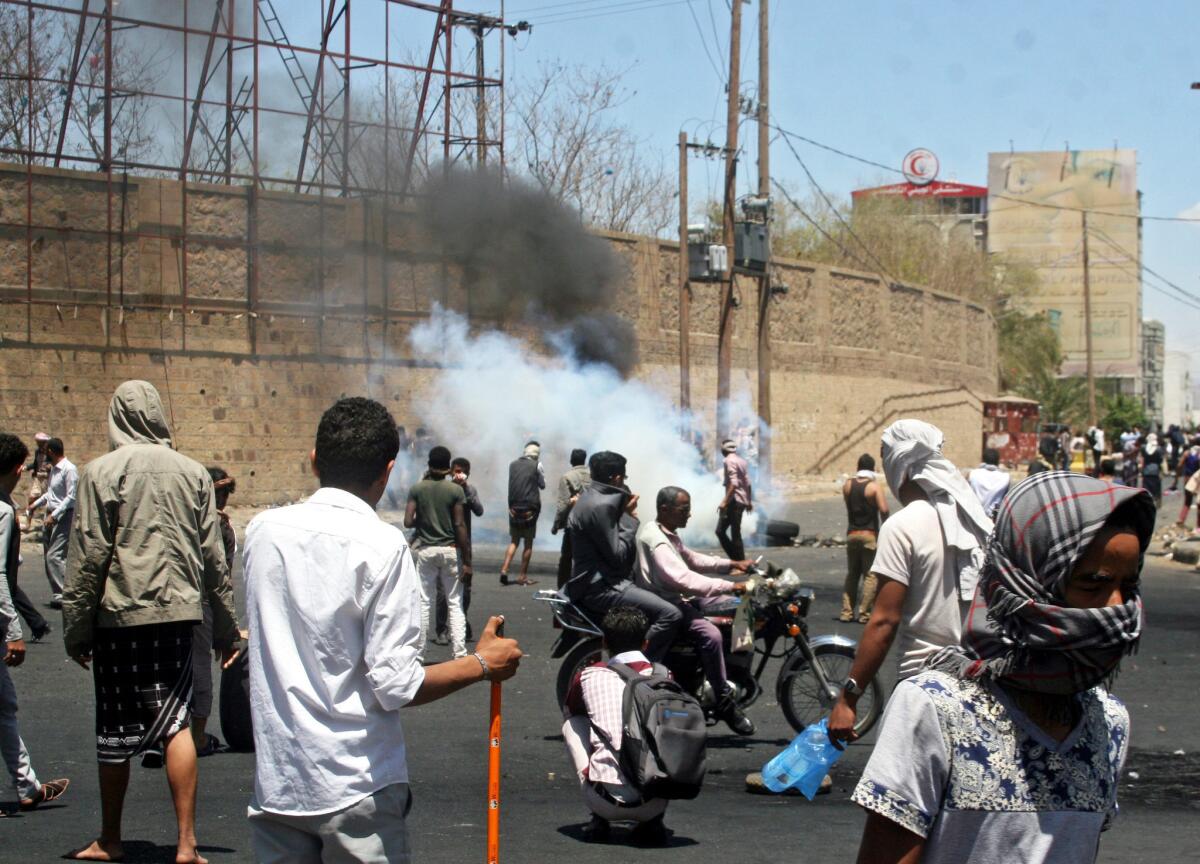U.S. forces leave Yemen amid concerns it is haven for terror groups

- Share via
Reporting from Washington — All remaining U.S. government personnel withdrew from Yemen over the weekend as fighting erupted near the last haven for American special forces there and an Iran-backed militia took control of key locations in the country’s third-largest city.
About 100 American special operations troops evacuated Al Anad airbase in the southern part of Yemen on Saturday, as Al Qaeda militants fought house-to-house in a nearby town. The withdrawal comes a month after the U.S. embassy in the capital of Sana was vacated, after months of Shiite rebels clashing with government forces there.
“Due to the deteriorating security situation in Yemen, the U.S. government has temporarily relocated its remaining personnel out of Yemen,” State Department spokesman Jeff Rathke said in a statement.
The U.S. departure from Yemen as it further descends into chaos is likely to hobble the American counterterrorism campaign against two potent extremist groups, the Islamic State and Al Qaeda in the Arabian Peninsula. The Islamic State militants who control large swaths of Iraq and Syria are extending their reach into both North Africa and Yemen, where intelligence officials are concerned they can take advantage of the lawlessness to expand their influence and recruit fighters, as they have elsewhere. And AQAP, the most resourceful and dogged of Al Qaeda’s affiliates, has repeatedly used Yemen to plot and stage attacks against the West.
The U.S. plans to continue to fly armed drones over Yemen and strike at leaders of cells plotting to attack Western targets, officials said. But without Americans on the ground and no friendly local intelligence service to turn to for help, the U.S. will have much less information about the location of militant leaders.
But the danger of remaining in Yemen proved too great over the weekend. Backed by Iran as well as ousted president Ali Abdullah Saleh, the Houthi militias overran additional territory in the southwest of Yemen, taking control of the international airport and government buildings in Taiz, Yemen’s third-biggest city, and persuading some of the city’s security forces to turn on the government.
The Shiite-led Houthis, whose leaders have received training and weapons from Iran, now control Sana and nine of the country’s 21 provinces.
The rebels’ newest push further endangers the rule of current President Abed Rabbo Mansour Hadi, a close counterterrorism ally of the United States and still recognized by the White House as the sole legitimate authority in the country.
Hadi, who fled Sana last month for the southern city of Aden, gave a defiant televised speech Saturday accusing Iran of orchestrating a coup against him and appealing to the United Nations for “urgent intervention.”
The speech inflamed rebel leaders already incensed by the gruesome suicide bombings at Shiite mosques in Sana on Friday that killed at least 137 men, women and children.
Islamic State leaders announced responsibility for the mosque attacks, the first claim of a major attack in Yemen by the group. The Islamic State also claimed to be behind the attacks that killed 20 foreign tourists and a policeman in Tunisia on Wednesday.
CIA director John O. Brennan said Sunday he is concerned about the expanding reach of the group, which ratcheted up its campaign against the U.S. on Saturday by posting online the names and addresses of 100 American military personnel and encouraging its followers to assassinate them.
“This is something that clearly is not just restricted to Iraq and Syria,” Brennan said on “Fox News Sunday.” “So we cannot relent.”
U.S. intelligence officials are also concerned that the turmoil gives Al Qaeda in the Arabian Peninsula “breathing room” to plot attacks against the U.S. Dozens of members of the group have been killed in a campaign of U.S. drone strikes in the country over the past several years.
The group said it planned the deadly shootings in January at the Paris offices of the satirical newspaper Charlie Hebdo. In 2010, bombmakers for the group hid explosives inside printer cartridges shipped to the U.S. and concealed a bomb inside the underwear of an operative who boarded a Detroit-bound jetliner on Christmas Day 2009. Both times, the bombs were discovered before they detonated.
U.S. Rep. Michael McCaul of Texas, chairman of the House Committee on Homeland Security, said the withdrawal from Yemen is going to hurt the ability of American intelligence services to watch Al Qaeda and Islamic State militants in the region.
“We are withdrawing completely,” McCaul said, speaking on ABC’s “This Week.” “We will have no intelligence footprint or capabilities to monitor what groups like AQAP, ISIS and the Shia militants are doing in the region,” McCaul said, using an alternative acronym for Islamic State.
The Associated Press contributed to this report.
Twitter: @ByBrianBennett
More to Read
Sign up for Essential California
The most important California stories and recommendations in your inbox every morning.
You may occasionally receive promotional content from the Los Angeles Times.











